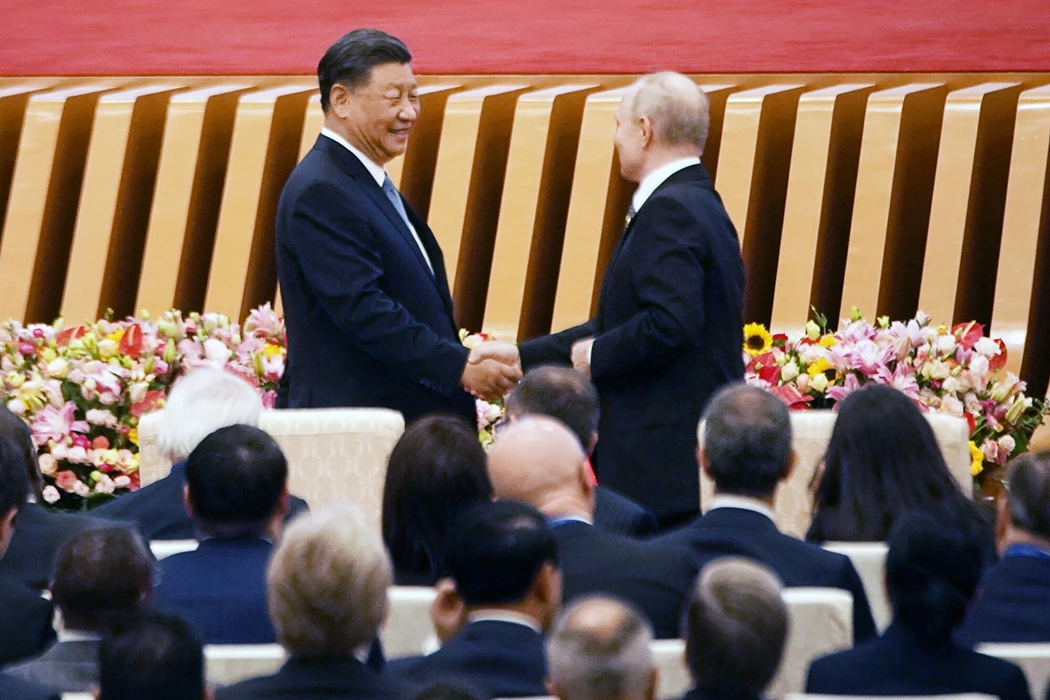Xi Backs Putin on Security, Wants Progress on Gas Pipeline
(Bloomberg) -- President Xi Jinping reiterated that China supports Moscow’s efforts in safeguarding its national sovereignty, security and development interests, while seeking a breakthrough on a Sino-Russian gas pipeline.
Deepening ties between China and Russia is not an expedient but a long-term solution, Xi told Russian counterpart Vladimir Putin during a meeting Wednesday in Beijing, according to a statement from the Chinese government.
China is keen to work with Moscow to ensure grain and energy security, and wants to see “substantial progress” on a natural gas pipeline between both countries and Mongolia as soon as possible, Xi added.
Xi’s comments reinforce the tight ties that have developed between China and Russia, especially since Putin ordered the invasion of Ukraine in February 2022. Beijing has provided diplomatic and economic support to Moscow that has helped blunt the effects of Western sanctions on Russia.

Still, Beijing has also sought to cast itself as a neutral broker on the war after releasing a 12-point blueprint for bringing peace to Ukraine in February this year that included calls to respect sovereignty, facilitate grain exports and halt all hostilities.
The proposals were panned by the US and its allies and have gained little traction, though they won Xi credibility among Global South nations.
Putin last visited China for the Winter Olympics in February 2022, a few weeks before he invaded Ukraine. At that meeting, the two leaders agreed to a “no-limits” friendship and signed a series of long-term energy supply deals. Putin’s attendance at Xi’s Belt and Road Initiative forum is his first trip abroad to nations other than former Soviet states since the International Criminal Court issued an arrest warrant against him in March for alleged war crimes in Ukraine.
In September, Putin said Russia’s cooperation with China has reached “unprecedentedly high levels.” With the West severing trade ties, China’s exports to Russia have jumped 57% so far this year. China is now the largest importer of fossil fuels from Russia, with coal shipments more than doubling since 2020.
“Russia has limited options as its economic dependency on China deepen — even though Moscow understands its predicament,” said Philipp Ivanov, a senior fellow at the Asia Society in New York. But “Chinese investments in Russia remain disproportionately small. Chinese companies are wary of political risks, secondary sanctions, corruption and overall unpredictability of the Russian market.”
More: Xi’s Diplomatic Gamble on Putin Leaves Both With Much to Lose
The gas pipeline, known as Power of Siberia 2, is intended to deliver supply from Gazprom’s Yamal fields and western Siberia to China via Mongolia. For months, the Russian government has said talks with China are “in the final stages” but concrete progress has been elusive.
The project, which would take years to build once approved, would help boost Russia’s total gas shipments to China as Moscow looks to its giant Asian neighbor to replace Europe as its major gas customer.
Xi portrayed his signature BRI as a sweeping alternative to the US-led world order in a speech earlier Wednesday, a vision for global economic cooperation endorsed by Putin.
Chinese Foreign Minister Wang Yi also said certain nations had “drawn on or even copied what China did” with the BRI, without naming them. Last month, the US signed an agreement with India, Middle Eastern countries and the European Union aimed at connecting them via a network of railways and sea routes.
The two heads of state also had an “in-depth exchange of views” on the “conflict between Palestine and Israel,” according to China’s statement, which didn’t provide more details. China said it supports Russia hosting the BRICS summit in 2024.
More: Russia’s Cash Flood Turns to Trickle as Energy Revenues Slide
China and Russia should develop pragmatic cooperation of high quality and actively explore partnership in “strategic emerging industries,” Xi also told Putin, indicating ties between the nations are likely to remain warm.
“For China it’s a winning proposition as it gets access to Russian commodities and agricultural exports/food at discounted prices, and its brands like Huawei are expanding presence in a large market without any significant competition,” Ivanov said.
(Updates with more context.)
©2023 Bloomberg L.P.





